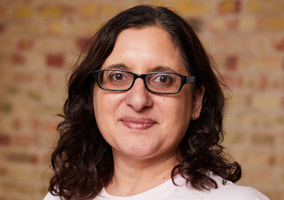August is Black Philanthropy Month (BPM), a global celebration and campaign to create a Black Funding Renaissance to strengthen our communities. Recognised by the United Nations and over 35 government bodies as an important annual cultural event, BPM has engaged 19 million people from 60 countries since its inception 10 years ago.
From London to Lagos, from Minneapolis to Manaus, from Paris to Port-Au-Prince, converging crises (economic, political and cultural) threaten 20th-century gains in all corners of the world where Black communities exist. But as givers, investors and social change innovators, we have the capacity to unify to achieve lasting change. This has been our truth for centuries.
With Martin Luther King's rally cry about the “fierce urgency of now” in mind, four women came together in 2019 to create GiveBLACK with a mission to elevate the culture of Black giving in the UK to serve the needs of Black communities as well as wider society.
We commissioned 'Valuing the Black Philanthropic Pound: Patterns and Motivations for Black Giving in Britain' to combine solid evidence gathering with a strong call to action in order to galvanise Black philanthropy in Britain. We believe this ground-breaking report provides the insight we need to launch a campaign of fundraising by us, for us.
Why should we support identity-based giving?
2020 became a defining moment for racial equity. The disproportionate impact of coronavirus on Black and Asian communities collided with the searing aftermath of George Floyd’s murder. The world connected for a moment to their humanity and acknowledged the disparity of treatment that Black people experience.
While charitable giving in Britain by individuals, companies and grant-making organisations – estimated to exceed £16bn a year – has filled some of the gaps, for most Black-led organisations accessing this charitable giving has proven extremely difficult.
One important finding of the GiveBLACK report is Black-led charitable organisations’ belief that they are often overlooked and excluded from applying for large sources of funding. Black fundraisers also fear that the increase in giving to Black community organisations that followed high-profile Black Lives Matter responses will not last.
Many grant-makers acknowledge that there is a substantial and historic imbalance of power in the charitable funding ecosystem which has influenced how funding has been allocated. While some funders are working hard to address the issues of visibility and accessibility, others are very reluctant to relinquish power in pursuit of racial justice.
With racial and social disparities brought sharply into focus, and the looming economic crisis certain to widen further the inequalities that confront Black communities, we believe the time has come for Britain’s Black communities to leverage our own resources to achieve equity.
The reality for most Black-led organisations is chronic under-resourcing, despite delivering vital solutions at grassroots level that benefit wider society. These community focused organisations are tackling social mobility, poverty alleviation, education and youth services, health and well-being, criminal justice, community development, arts and cultural advancement, history and heritage and social enterprise. They are usually borne out of necessity.
GiveBLACK seeks a self-sustaining model of giving within Britain’s Black communities. Although public funding will still be needed, dependency on government largesse is neither reliable nor ideal. The same is true of reliance on support from mainstream funders who are not guaranteed to stay the course and to which access remains problematic for many Black-led community organisations.
Britain’s Black communities are usually seen as recipients of charity rather than as donors. Because people of African and Caribbean heritage in the UK typically hold the lowest wealth (£24,000 family wealth per adult vs £197,000 family wealth per white British adult according to Resolution Foundation in 2020), we are too often viewed as part of a dependency culture, which successive governments have sought to eliminate, even though we know our generosity is substantial.
Black Britons have a strong history of giving and volunteering through churches, mosques and other community organisations, as well as a tradition of supporting extended family members in the UK and beyond. Despite considerable worry over our own household finances and job insecurities, those of us who can afford to give have done so. It is a truth that those with the least financial means are those who give the most.
Our strong traditions of giving and self-help is how Black communities have made it through trying times. This is seen in the collective savings and loan schemes like Pardner and Susus as well as the growth of Black-led giving circles.
Yet our stories of giving aren’t being told. We know too little about our big donors as well as the everyday grassroots givers that exist in Black communities. Except for a few widely publicised individual acts of philanthropy by Black celebrities such as Marcus Rashford and Stormzy, Black giving in Britain has remained largely hidden until now.
We hope GiveBLACK can help kickstart the storytelling
Visibility is essential, providing exemplars for others and to wield the influence that helping ourselves delivers.
Our report notes that the current lack of visibility within Black philanthropy is highly problematic for both donors and fundraisers. Black-led charitable organisations need to engage with potential Black donors and learn how to communicate with them effectively.
We need to build coalitions of Black donors, Black trustees at grant-making organisations, Black-led organisations with deep community roots, institutional funders and policymakers as well as other allies to form a powerful ecosystem of intentional philanthropy.
The collective generosity of Black Britons – if harnessed and channelled appropriately – has the potential to play a major role in delivering racial justice.
We ask everyone who believes in this mission to register to join the #GiveBLACK coalition at [email protected] or sign up to support our campaign.
Other Voices
Sonya Ruparel: It's time to stop making grants without considering equity
It's time to reimagine grantmaking through an equality, diversity and inclusion lens, Sonya Ruparel from Turn2us argues
Manu Maunganidze: The need for transparency about racial diversity in the environmental sector
Only 4.8% of environment professionals identify as Black, Asian or minority ethnic, compared with a 12.6% average across all professions. Manu Maunganidze explains why environmental organisations and diversity specialists have launched Race Report environmental and green charities to report on the racial diversity of their workforce each year
Gender pay gaps in charities: Lessons from five years of data
Women in a sample of 100 large charity employers earn on average 90p for every £1 men earn. Kirsty Weakley looks at what the latest gender pay gap tells us













